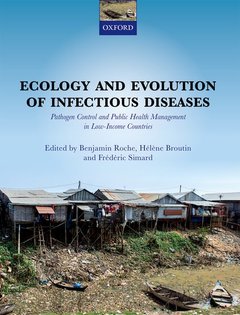Description
Ecology and Evolution of Infectious Diseases
pathogen control and public health management in low-income countries
Coordinators: Roche Benjamin, Broutin Hélène, Simard Frédéric
Language: English
Subjects for Ecology and Evolution of Infectious Diseases:
Publication date: 06-2018
334 p. · 18.9x24.8 cm · Paperback
334 p. · 18.9x24.8 cm · Paperback
Description
/li>Biography
/li>
In recent years, the ecology and evolution of infectious diseases has been studied extensively and new approaches to the study of host-pathogen interactions continue to emerge. At the same time, pathogen control in low-income countries has tended to remain largely informed by classical epidemiology, where the objective is to treat as many people as possible, despite recent research suggesting new opportunities for improved disease control in the context of limited economic resources. The need to integrate the scientific developments in the ecology and evolution of infectious diseases with public health strategy in low-income countries is now more important than ever. This novel text uniquely incorporates the latest research in ecology and evolutionary biology into the discussion of public health issues in low-income countries. It brings together an international team of experts from both universities and health NGOs to provide an up-to-date, authoritative, and challenging review of the ecology and evolution of infectious diseases, focusing on low-income countries for effective public health applications and outcomes. It discusses a range of public health threats including malaria, TB, HIV, measles, Ebola, tuberculosis, influenza and meningitis among others.
Benjamin Roche is a researcher at the French National Research Institute for Sustainable Development (IRD) in Montpellier, France. His work has mostly focused on the study of diversity involved in infectious diseases, from diversity of hosts (i.e., dilution effect) to the diversity of pathogens (through phylodynamics of influenza viruses) through diversity of transmission modes (consequences of direct and environmental transmission of influenza viruses and Buruli ulcer). He is also working on vector control strategies against Chikungunya in French overseas territory and on prevention strategies against Buruli ulcer in Cameroon. He is leading an international project aiming to develop an innovative conceptual and methodological framework to envision optimal public health strategies. He has published more than 60 papers in leading international journals. Hélène Broutin is a researcher at CNRS (the French National Center of Scientific Research) working on the ecology of infectious diseases. She is currently based at the University Cheikh Anta Diop of Dakar, Senegal. Her principal research focuses on vaccine preventable diseases in low income countries, mainly in Africa. She uses a multidisciplinary approach to identify the determinants (environmental, genetics, genetic, and population) that drive the transmission dynamics of infectious diseases, and the impact of vaccination, with a specific focus on meningitis, respiratory infections, pertussis, and measles. The final goal of her research is to help improve vaccine strategies for a better control of diseases in the long term in low income countries. She is a member of the steering committee of MERIT (Meningitis Environmental Risk Information Technologies), an international experts group on meningitis in Africa led by WHO. She has published more than 20 papers in international journals. Frederic Simard is an expert in vector biology and control working at the French National Research Institute for Sustainable Developm
© 2024 LAVOISIER S.A.S.




